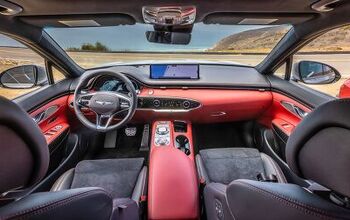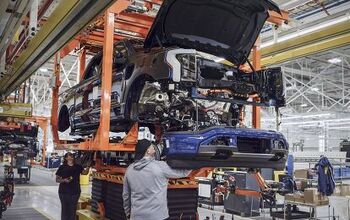Oh No, Volvo Might Never Make Another Wagon Again

Volvo is moving away from traditional wagons and instead is banking on SUVs and high-riding electric hatchbacks to fill the void. Ew, this timeline is depressing.
Key Points
- Volvo is shifting its focus to high-riding electric hatchbacks and SUVs, believing they offer the same practicality and space that estate buyers once sought.
- The ES90 replaces the S90 and V90 with a more versatile design with a hatchback-style rear, higher ride height, and 40:20:40 split-folding seats,
- Volvo’s future lineup leaves no room for estates instead, models like the XC60 will be positioned to fill that role.
With models like the new ES90, Volvo believes it can retain the practicality and spaciousness that estate buyers once sought but in a form more aligned with modern consumer trends.
The shift isn’t entirely unexpected. Volvo’s XC60 and XC90 SUVs have been among the brand's best-selling models, and now the automaker is adapting its sedan lineup to reflect the same priorities. The ES90 will effectively replace both the S90 and V90— it rides higher than a conventional sedan and features a sloping roofline while maintaining the versatility of a hatchback. By the spec sheets, the ES90 has more cargo capacity than a Volkswagen Golf with the seats up, but less than the Golf with the seats folded down.
Autocar straight up asked Volvo CEO Jim Rowan if the company will stop making wagons. His answer will make you sad. "Yeah, because I think it’s changed, right? SUVs have changed with ride height," he told the publication.
"One of the things that changed over the years is the decision makers of buying a Volvo car over-indexes to women, because they like a higher ride height. Then with our saloons, with the ES90, you will see we’ve brought the ride height up, rather than down."
The company’s long-term ‘8x8’ product strategy—eight models over an eight-year cycle, with a significant refresh at the halfway mark—doesn’t leave room for a traditional long-roof estate. In fact, Rowan hinted that the brand could scale back to a ‘7x7’ lineup instead, making niche offerings even less likely.
Rather than introduce a direct estate replacement, Volvo plans to reposition existing models to appeal to those customers. Rowan suggested that the XC60 will take on the role of the discontinued V90 estate. "Rather than bring a V90, for example, are we better to position that car [the XC60] in a slightly different way?"
Volvo is already experimenting with more tailored versions of its SUVs. "We have the Black Edition, we have the Cross Country edition. So we now have different editions of the same base car," Rowan explained. This approach is more cost-effective, allowing Volvo to focus on volume rather than stretching resources across multiple niche models.
"We’re a reasonably small company with limited resources," Rowan noted. "We’re making very conscious choices about where we want to play the game and where we’re differentiated."
So if you want a traditional long-roof Volvo, go get one now, because soon you won't even have the choice.
Become an AutoGuide insider. Get the latest from the automotive world first by subscribing to our newsletter here.

An experienced automotive storyteller and accomplished photographer known for engaging and insightful content. Michael also brings a wealth of technical knowledge—he was part of the Ford GT program at Multimatic, oversaw a fleet of Audi TCR race cars, ziptied Lamborghini Super Trofeo cars back together, been over the wall during the Rolex 24, and worked in the intense world of IndyCar.
More by Michael Accardi




































Comments
Join the conversation